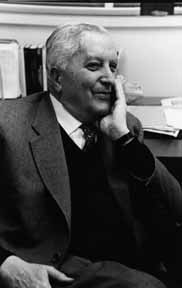
| * The Ilya Prigogine Center for Studies in Statistical Mechanics and Complex Systems *recently renamed Center for Complex Quantum Systems | HOME | |
| Prof. Ilya Prigogine annie@physics.utexas.edu | ||
|
Ilya Prigogine Institutes and Centers of Study in the World
| ||
Ilya Prigogine was awarded the Nobel Prize in chemistry in 1977 for his contributions to nonequilibrium thermodynamics, particularly the theory of dissipative structures. He was born in Moscow, Russia on January 25, 1917. He obtained both his undergraduate and graduate education in chemistry at the Universite Libre de Bruxelles. He was Regental Professor and Ashbel Smith Professor of Physics and Chemical Engineering at the University of Texas at Austin. In 1967, he founded the Center for Statistical Mechanics, later renamed the Ilya Prigogine Center for Studies in Statistical Mechanics and Complex Systems. Since 1959, he was the director of the International Solvay Institutes in Brussels, Belgium. In 1989, Prigogine was awarded the title of Viscount by the King of Belgium. He was a member of 64 national and professional organizations, among which are the National Academy of Sciences and the American Academy of Arts and Sciences. The most recent of Prigogine's many international activities were Special Advisor to the European Community in Brussels, Belgium and Honorary Member of the World Commission of Culture and Development of UNESCO, chaired by Perez de Cuellar.
The main theme of the scientific work of Ilya Prigogine was a better understanding of the role of time in the physical sciences and in biology. He contributed significantly to the understanding of irreversible processes, particularly in systems far from equilibrium. The results of his work on dissipative structures have stimulated many scientists throughout the world and may have profound consequences for our understanding of biological systems.
Prigogine received numerous national awards and prizes, including the Golden Medal of the Swante Arrhenius, Swedish Academy; Rumford Gold Medal, Royal Society of London; the Descartes Medal, Paris; Commander of the Legion of Honor, France; Imperial Order of the Rising Sun (Gold & Silver Medals), Japan; Medaille d'Or, France; Russian International Scientific Award, First "N. N. Bogolyubov Prize," Joint Institute for Nuclear Research, Dubna; Medal of the President of the Italian Senate, awarded by Pio Manzu International Research Center, Italy; Norbert Wiener Gold Medal of Ukbridge; Medal of Member of the European Academy of Yuste; Silver Medal of V.I. Vernadskiy, the Academy of Natural Sciences of Russia and Commander of the World Order "Science. Culture. Education." European Academy of Information, 2002. He received 53 honorary degrees.
Is Future Given?
World Scientific, Singapore
2003
Modern Thermodynamics: From Heat Engines to Dissipative
Structures
(with D. Kondepudi)
John Wiley & Sons, Chichester
1998
The End of Certainty, Time, Chaos and the New Laws of
Nature
(with I. Stengers)
The Free Press, New York
1997
Exploring Complexity
(with G. Nicolis)
W. H. Freeman &
Co., San Francisco
1989
Order Out of Chaos
(with I. Stengers)
Bantam Books, New
York
1983
From Being to Becoming: Time and Complexity in the Physical
Sciences
W. H. Freeman & Co., San Francisco
1980
Self-Organization in Non-Equilibrium Systems: From Dissipative
Structures to Order Through Fluctuations
(with G. Nicolis)
J.
Wiley & Sons, New York
1977
Nonequilibrium Statistical Mechanics
Wiley-Interscience, New
York
1962
